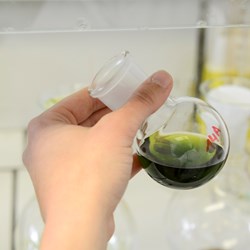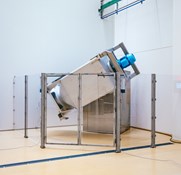


Research by Food & Lipids, KU Leuven Campus Kulak Kortrijk, has shown that microalgae are naturally less sensitive to oxygen than fish oil. "This makes microalgae a suitable source of the long-chain omega-3 fatty acids EPA and DHA for food enrichment," explains Prof. Dr Imogen Foubert.

© KU Leuven
Long-chain omega-3 fatty acids EPA and DHA have several health benefits. They reduce the risk of cardiovascular disorders and are necessary for brain development in foetuses and young children, concludes Professor Imogen Foubert of Food & Lipids, KU Leuven Campus Kulak Kortrijk, listing some of the benefits. "Unfortunately, most consumers do not get enough of these fatty acids through their diet." Our bodies barely produce these fatty acids at all, so the health benefits are not achieved. The recommended daily intake (RDI) is somewhere between 140 and 600 milligrams per day, depending on the country and health organisation consulted.

© KU Leuven
The easiest way
The easiest way to get enough EPA and DHA is to eat more fatty fish, but fish stocks are too small to supply everyone. Because omega-3 fatty acids in fish oil are very sensitive to oxygen due to their chemical structure (double bonds), hardly any food products are enriched with them. So it was necessary to look for alternative sources that are suitable for enriching food products.

© KU Leuven
Microalgae as a source
Autotrophic microalgae, grown using CO2 and sunlight, quickly came into the picture, continues Foubert. "Fatty fish only contain EPA and DHA because they consume microalgae, which are the first step in the marine food chain." An important advantage of these microalgae, compared with fish oil and heterotrophic microalgae grown using an organic carbon source such as glucose, is the presence of endogenous antioxidants: carotenoids, polyphenols, phytosterols and certain vitamins. This was shown in the doctoral research conducted by Eline Ryckebosch of Food & Lipids. Stability was also closely examined. "It has been shown that carotenoids in particular prevent oxidation," Foubert explains. The big downside of these microalgae is now the cost price. The technology for cultivating and processing the biomass is still under development. The professor expects microalgae with omega-3 fatty acids to reach the market within a few years.

What exactly will today's consumers want on their plates tomorrow? It is with this rather tricky question in mind that food companies are constantly striving to develop products that meet the needs of even the most discerning gourmets.

Protein-enriched food products offer convenience for those who should or would like to consume more protein. Generally, it is not necessary to consume these products.

“We are receiving a growing number of enquiries from our clients on the prevention of cross-contamination in the mixing and packaging of dry ingredients for the food industry", says Domien Sierens of Food Blending. “Hygiene and quality assurance are our top priorities".

At the Tavola gastronomic trade fair, from 17-19 March, Maisonie will launch four flavours of dessert with extra protein. In nutritional terms, two are sources of protein and two are rich in protein, Nathalie Van der Straeten tells us. She also reveals which plant proteins have been added.